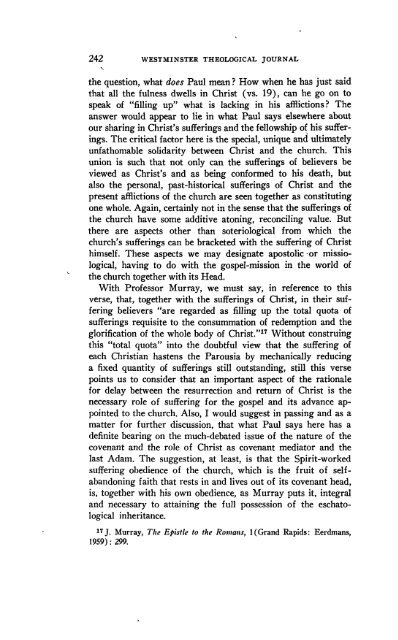NEW TESTAMENT THEOLOGY
Issues%20in%20New%20Testament%20Theology
Issues%20in%20New%20Testament%20Theology
Create successful ePaper yourself
Turn your PDF publications into a flip-book with our unique Google optimized e-Paper software.
242 WESTMINSTER THEOLOGICAL JOURNAL<br />
the question, what does Paul mean ? How when he has just said<br />
that all the fulness dwells in Christ (vs. 19), can he go on to<br />
speak of "filling up" what is lacking in his afflictions? The<br />
answer would appear to lie in what Paul says elsewhere about<br />
our sharing in Christ's sufferings and the fellowship of his sufferings.<br />
The critical factor here is the special, unique and ultimately<br />
unfathomable solidarity between Christ and the church. This<br />
union is such that not only can the sufferings of believers be<br />
viewed as Christ's and as being conformed to his death, but<br />
also the personal, past-historical sufferings of Christ and the<br />
present afflictions of the church are seen together as constituting<br />
one whole. Again, certainly not in the sense that the sufferings of<br />
the church have some additive atoning, reconciling value. But<br />
there are aspects other than soteriological from which the<br />
church's sufferings can be bracketed with the suffering of Christ<br />
himself. These aspects we may designate apostolic or missiological,<br />
having to do with the gospel-mission in the world of<br />
the church together with its Head.<br />
With Professor Murray, we must say, in reference to this<br />
verse, that, together with the sufferings of Christ, in their suffering<br />
believers "are regarded as filling up the total quota of<br />
sufferings requisite to the consummation of redemption and the<br />
glorification of the whole body of Christ." 17 Without construing<br />
this "total quota" into the doubtful view that the suffering of<br />
each Christian hastens the Parousia by mechanically reducing<br />
a fixed quantity of sufferings still outstanding, still this verse<br />
points us to consider that an important aspect of the rationale<br />
for delay between the resurrection and return of Christ is the<br />
necessary role of suffering for the gospel and its advance appointed<br />
to the church. Also, I would suggest in passing and as a<br />
matter for further discussion, that what Paul says here has a<br />
definite bearing on the much-debated issue of the nature of the<br />
covenant and the role of Christ as covenant mediator and the<br />
last Adam. The suggestion, at least, is that the Spirit-worked<br />
suffering obedience of the church, which is the fruit of selfabandoning<br />
faith that rests in and lives out of its covenant head,<br />
is, together with his own obedience, as Murray puts it, integral<br />
and necessary to attaining the full possession of the eschatological<br />
inheritance.<br />
17 J. Murray, The Epistle to the Romans, 1(Grand Rapids: Eerdmans,<br />
1959) : 299.


